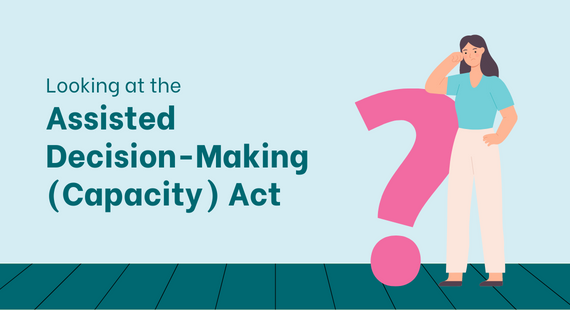
We explore the new Assisted Decision-Making (Capacity) Act, why it’s important, and what kinds of decision supports will be available.
The Assisted Decision-Making (Capacity) Act is a new law due to come into effect in Ireland in early 2023. This is an important law which will advance the rights of people with disabilities in Ireland, including people experiencing mental health difficulties.
Below, we share an overview of the law and some of the main changes it will bring.
What is assisted decision-making?
"Assisted decision-making" or "supported decision-making" means we are supported and enabled to make choices and decisions about our lives at times when we may be unable to do so on our own.
Supported decision-making can take different forms. It can include being given:
- information in a way that is understandable to us
- information about the choices available to us
- enough time and support to consider our choices.
It can also include making advance plans or legal arrangements that will come into place in the future if there is a time when we have difficulty making decisions.
Supported decision-making is different from previous systems in place, where a decision was made for someone else "in their best interests". This is referred to as "substitute decision-making".
Why is this important?
We all have the right to make decisions about our own lives, what is important to us, and what our preferences are on different matters. At different stages in our lives, we may be unable to make or have difficulty with making decisions about important issues for a variety of reasons. This might be due to physical or mental health reasons, or because of an intellectual disability, for example.
Support to make decisions may be needed only to help with specific areas of our lives. For example, a person might be able to make decisions about healthcare independently, but then may need help to make decisions about finances or housing. Someone also may only need support to make decisions for a limited amount of time; for example, due to mental health reasons. Someone else may need ongoing or increasing decision supports; for example, if someone has a progressive condition such as dementia.
Assisted or supported decision-making means that our will and preferences are at the centre of decisions about our lives, even at times when we may be unable to communicate them clearly by ourselves. A person’s “will” is about their values, beliefs and goals, and a person’s “preferences” means a greater liking for one choice over another.
What is the Assisted Decision-Making (Capacity) Act?
The Assisted Decision-Making (Capacity) Act is a new law in Ireland which sets out a legal framework for assisted decision-making. It establishes a new service – the Decision Support Service - to put in place many of the changes and to provide information to the public. It introduces different levels of support a person can access to help them make decisions if needed. These are outlined below.
Important principles of the Act include that:
- a person is presumed to have capacity to make decisions unless proven otherwise
- a person should be supported to make decisions in so far as possible
- a person has the right to make an "unwise" decision if they choose to
- a person has the right to access different supports to help make decisions if they need them.
The Act replaces the "Wards of Courts" system previously in place, which is an example of a substitute decision-making approach.
You can watch a brief video explaining the Act here.
Why is this new law important?
This law is important because it strengthens the human rights of people in Ireland, and especially the rights of people with disabilities. In particular, it recognizes that everyone should enjoy ‘legal capacity’ regardless of disability. Legal capacity involves the right to make decisions about our lives and speak on our own behalf. It is an important part of the United Nations Convention on the Rights of Persons with Disabilities (UNCRPD) which Ireland has signed up to and must work on implementing. You can learn more about legal capacity and the UNCRPD in this short video.
The UNCRPD also recognizes that people with disabilities may, at times, need help and support to exercise legal capacity, and supported decision-making allows for this.
What types of decision supports are there?
Decision supports can take different forms. People can access different levels of support and nominate others to help them in different ways. These are:
A decision-making assistance agreement
A decision-making assistance agreement is a written agreement you prepare in which you identify one or more people you trust to act as a decision-making assistant to help you make decisions. In the agreement, you can choose what decisions you need help with. For example, these might be about your personal welfare or money matters.
You can find more information about decision-making assistance agreements here.
A co-decision making agreement
A co-decision making agreement is a written agreement you prepare in which you choose a person to make decisions jointly with you as a co-decision-maker. This can be helpful if you are unable to make decisions on your own.
You can find more information about co-decision making agreements here.
A decision-making representative
A decision-making representative is someone who is appointed by the court to make certain decisions on your behalf, taking into account your wishes. This can happen if you are unable to make decisions, even with help. The person appointed can be someone you know and trust, or a person from a special panel who is trained for the role.
You can find more information about decision-making representatives here.
An advance healthcare directive
An advance healthcare directive is a document that you complete at a time when you are able to make decisions, about your preferences for healthcare treatment you might need in the future. It comes into effect if, in the future, there is a time when you are unable to make decisions about your healthcare.
As part of this, you can choose someone to act as a designated healthcare representative to make sure your directive is followed. You can include things like where you would like to be admitted to hospital if that’s required, treatments you would prefer, and treatments you do not want. Healthcare providers must respect your wishes to refuse certain treatments if you have included this. Requests or preferences for certain treatments do not have to be followed by healthcare providers, but should be used to help with care plans.
There is one exception to the legal recognition of advance healthcare directives in mental healthcare settings, which is explained below.
You can learn more about advance healthcare directives here.
Enduring powers of attorney
Another way to plan ahead is by making an enduring power of attorney. This allows you to choose one or more people you know and trust to act on your behalf should you be unable to make certain decisions in the future. The person is referred to as your "attorney" under this arrangement. These decisions might be about your personal welfare, property or money matters. You can choose what decisions the person will have authority to make.
What does the new law mean for mental healthcare?
Assisted decision-making is an example of a shift to rights-based approaches to disability and mental healthcare. A human rights-based approach to care and support is one that “seeks to ensure that the human rights of people using health and social care services are protected, promoted and supported in practice, and embedded in the culture of a service”.
Mental health services and people working in mental healthcare will need to learn about and uphold the requirements of the law. They may also need to make changes to how they work to ensure people’s right to make decisions about their lives, including their healthcare, are promoted and protected.
Capacity to make decisions
An important principle of the Assisted Decision-Making Act is the "presumption of capacity". This means that it should be assumed that all adults are able to make decisions for themselves, unless proven otherwise.
Another key principle of the law is that people should be supported as much as possible to make their own decisions. This means staff must ensure people have enough time and understandable information about their choices to make decisions.
Formal decision support arrangements only become relevant when:
- a person has chosen to set them up
- at such a time when the person is having decision-making capacity difficulties.
When there is a concern that a person may not be able to make a decision about an issue at a particular time, a "functional assessment of capacity" may be completed to determine if this is the case. This means answering the question-
“In relation to this specific issue, at this time, does this person have capacity"? An important follow-up question to this is "what level and type of support might be needed in order to assist this person to make a decision"? “
If someone is found to be having difficulties with decision-making capacity, the decision supports chosen by the person may then be put into action if appropriate; for example, if a person has a co-decision maker arranged or has prepared an advance healthcare directive. Mental health services and staff will need to engage with a person’s decision supporter if they are found to be unable to make decisions relevant to their healthcare at a particular time.
Advance healthcare directives and mental healthcare
If someone has an advance healthcare directive in place and they become unable to make relevant decisions during time at a mental healthcare facility, the staff and service will need to be aware of this and use it to help with treatment decisions. This means that, where particular treatments or aspects of care have been refused in advance by a person within an advance healthcare directive, this must be respected. Requests for particular treatments or aspects of care should be taken into account by the service and staff, but do not have to be followed.
One important exception under the law concerns people admitted to hospital on an involuntary basis. If someone has been admitted to a mental health hospital on an involuntary basis due to a risk of harm to themselves or others, an advance healthcare directive does not have to be upheld or referenced under the law.
Where can I get more information?
You can get more information from the Decision Support Service’s website. You can also call the Decision Support Service on 01 211 9750 or email queries@decisionsupportservice.ie.
Sage Advocacy also provides more information: visit the Sage Advocacy website here. You can call Sage Advocacy on 01 536 7330 or email info@sageadvocacy.ie.

